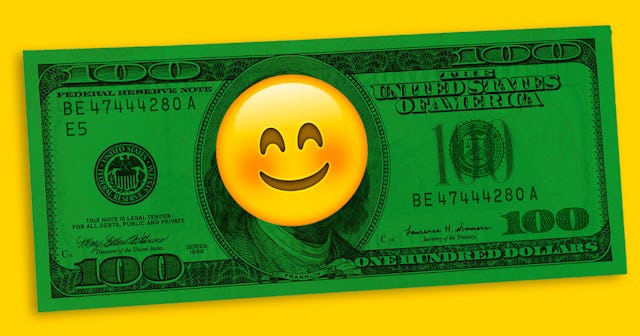The Truth Is That More Money = More Happiness

A recent study showed that as annual salaries increase, so does happiness. Who else is not shocked even a little bit? Of course money can’t technically buy happiness, but I would risk Biggie’s warning that more money causes more problems. Money can fix a lot of problems too; so for those of you too burdened by your cash, please let me take it off of your hands. Money has its limits, but it can make life easier, safer, and richer.
Matthew Killingsworth, a researcher at the University of Pennsylvania, wanted a more comprehensive look at money’s influence over people’s overall well-being. The study captured two million data points from 33,000 people who participated in the study. Killingsworth’s study was different than some of the other studies done to evaluate people’s happiness based on their income because it also captured random moments during an individual day using an app called Track Your Happiness. The data provided a “moment-to-moment” look at people’s lives.
Our lives are made up of everyday moments; the accumulation of good vs. bad and how we are able to enjoy or handle each can give us a sense of the quality of our lives. This information is subjective, however, because one person’s joy may not bring joy to another person. And for one person, a flat tire may be simply an inconvenience — while for someone else it’s an expense they can’t afford or loss of a day’s work, if not loss of employment, for not getting to work.
The app asked people to rate the answer to questions like “How do you feel right now?” and “Overall, how happy are you with your life?” It also asked people to the measure positive feelings (confident, good, inspired, interested, and proud) as well as negative ones (afraid, angry, bad, bored, sad, stressed, and upset). The study found that the people’s happiness continued to rise well into six figure salaries. I know, gasp!
Other reports confirm this. University of Michigan Economics professor Justin Wolfers found that only 21 percent of Americans reported being happy when earning income in the lowest income brackets, while 53 percent of those living in the top 10 percent of income earners reported being happy. Those top earners were also less likely to say they were unhappy as well.
Money comes with a lot of perks, and one of them is choice. Many of us make decisions based on whether we can afford something. Then we decide if it’s cost effective or a good investment. Money gives us options and flexibility. Someone working full-time at minimum wage has less financial flexibility than someone who earns double that. Living paycheck to paycheck means the essentials need to be taken care of first—if possible—before money can be set aside for savings, trips, or “extras.” There is little wiggle room for unexpected expenses like medical bills or an appliance shitting the bed.
Deagreez/Getty
Killingsworth says, “People with a financial cushion can wait for one that’s a better fit. Across decisions big and small, having more money gives a person more choices and a greater sense of autonomy.” A financial safety net gives people not only choices to figure out what to do, but it gives people the confidence to do it.
I can still feel the stress in my body that I carried as a kid knowing we didn’t have the money we needed to make ends meet. But I also compare that to the financial security I have now. I’m exhausted from the hustle of the work I do and I still need to make more money to reach some of my goals, but I am much happier with the money I have now than the equivalent of the money that my parents had when I was a child, because I felt their stress too. I saw and heard the anger, desperation, and struggle to just stay above water.
I have what I need and most of what I want. Money isn’t the only factor that has increased my quality of life, but it certainly allows me to take care of my mental and physical health. It allows me to donate to people or causes that are important to me. It allows me to travel to see my long-distance partner. It allows me to take my kids on vacation. Money adds to the quality of my life’s everyday moments. It helps create these happy moments and experiences too.
Money also allows you to “buy” time. If you can afford to have someone do your yard work, housework, watch your kids, or take care of general life stuff, then you have more time to accumulate rich experiences. You can stay focused on goals and spend more time with friends and family. Your leisure time increases, and even if zero money is spent during that downtime, the rest and connection you get is invaluable.
Obviously, money has its limits. Money can’t fix one’s mental health, undo the death of a loved one, or cure addiction. It can’t save a marriage or improve one’s moral compass. Money can help us gain perspective, but it can’t always give us what we want. And people who make more money may work longer hours, have more debt, or have made other sacrifices to achieve higher income levels. Missing your kids or working yourself to death isn’t worth the extra money.
But as money increases, so does our ability to provide the basics for ourselves and our family. More money means more living and less surviving. So when someone is working their ass off to stay afloat and feeling scared or miserable, stop telling them money can’t buy happiness … because it sure as fuck can.
This article was originally published on